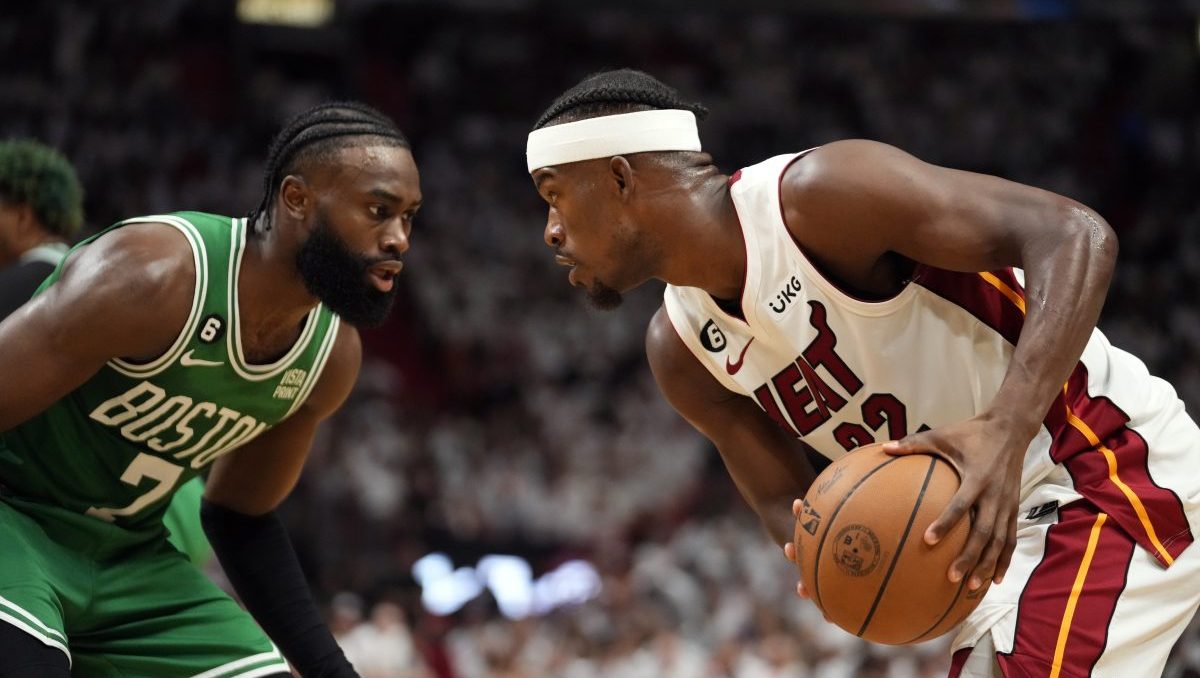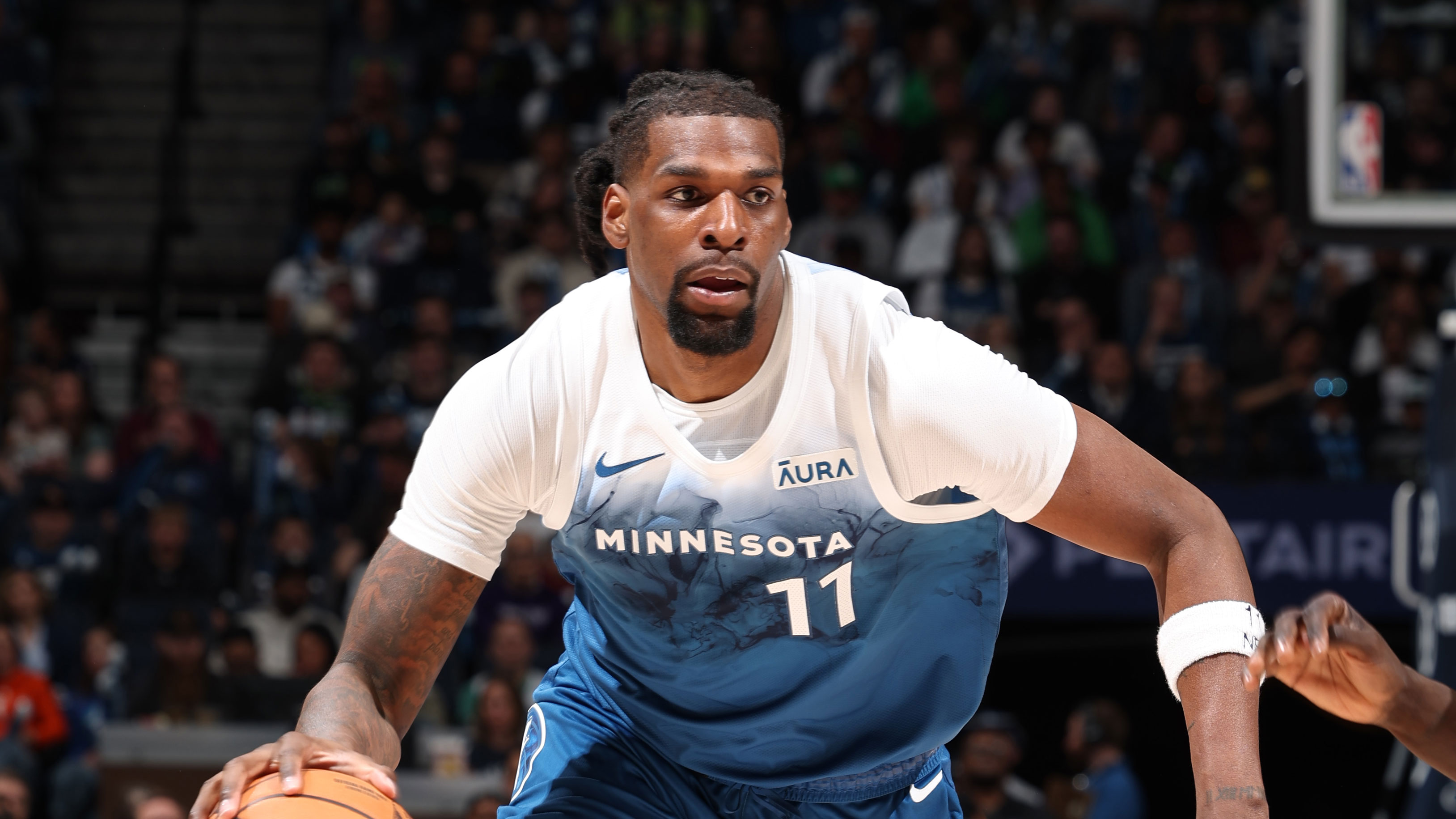Sure enough, the Sixers will have to beat the defending Eastern Conference champions in order to take that title.
With Game 1 of the team’s second-round playoff series against the Celtics set for Monday night, here are 11 thoughts and tidbits on the matchup:
1. Just like ahead of the Sixers’ second-round meeting with the Hawks two years ago, Joel Embiid’s right knee is a massive factor and it’s uncertain whether he’ll be active for Game 1.
Stay in the game with the latest updates on your beloved Philadelphia sports teams! Sign up here for our All Access Daily newsletter.
Clearly, the Sixers will have a better shot to knock off Boston if Embiid both plays through his right knee sprain and looks like the borderline unstoppable MVP favorite who totaled 93 points on 32-for-46 shooting over the last two Sixers-Celtics games of the regular season. As he showed last postseason, Embiid will be determined not to let soreness, discomfort, pain, or anything else prevent him from being available. Beyond that, it’s hard to project exactly how he’ll impact this series.
2. Paul Reed appears set to play a substantial role regardless of Embiid’s status. Though the Celtics had the NBA’s best defensive rebounding rate during the regular season, per Cleaning the Glass, Boston didn’t have a strong first-round series on that front against Atlanta. Across the six games, backup Hawks big man Onyeka Okongwu grabbed 19 offensive rebounds and starter Clint Capela had 15. Reed isn’t the world’s most dependable backup center, but he’s consistently been an excellent offensive rebounder who’s provided exceptional hustle.
“Someone told me, ‘Hard work creates good luck.’ And Paul works so hard that he puts himself in positions to be successful,” Georges Niang said Wednesday. “So you can almost look past some of the mental mistakes that he makes. He’s in here all the time working on his craft so that he knows what he’s supposed to be doing and what he’s not supposed to be doing. And if he does (make a mistake), he’s not making compounding mistakes. I think that’s what people were frustrated with him before, is he’d make the same mistake over and over again.
“And now he’s more or less like, ‘OK, I messed up. We can live with it. I’m not going to let that happen (again).’ And then he plays so hard that he does, like, five good things that outweigh the one bad thing. I think that’s huge for him, because he’s always been a worker but now everybody gets to see it with more opportunities that he’s creating for himself with his hard work.”
NBA
3. After practice Thursday, Sixers head coach Doc Rivers mentioned the team worked on smaller, “quirkier” lineups. Presumably, P.J. Tucker featured at the five in those units.
While the Sixers have been deeply appreciative of Tucker’s wise veteran’s contributions and on-court dirty work, his jumper might be very important in this series. On the night Embiid scored 52 points against Boston, Tucker made three massive corner three-pointers late in the fourth quarter. Especially in situations when he’s next to Embiid and Boston plays two-big lineups with Al Horford and Robert Williams III, we expect Tucker to have open jumpers. After sporting a 40 percent mark on corner threes in the regular season, Tucker dropped to 20 percent (3 for 15) against the Nets in Round 1. The Sixers will ask him to accept good looks, and they sure wouldn’t mind some clutch makes.
4. James Harden’s efficient 35-point performance was the biggest bright spot from the Sixers’ season-opening loss at TD Garden. Harden took and made 12 foul shots that evening against the Celtics, who ultimately finished No. 3 in defensive free throw rate, according to Cleaning the Glass. Similar Harden showings in that regard would be great for the Sixers, although his first-round problems in the paint were glaring. Harden shot 5 for 26 (19.2 percent) from nine feet and in, per NBA.com/Stats. The 10-time All-Star will need to be much better at making shots that are typically easy for him.
5. Avoiding slow-developing, awkwardly spaced possessions will also be key for Harden. His teammates are responsible for being attuned to details like when the dunker spot is occupied by a cutter, but Harden’s role will be large here, too. Instead of walking the ball down regularly against Marcus Smart’s full-court pressure, the Sixers will want Harden to search for advance passes and be persistent about running brisk, purposeful half-court offense.
“I just thought we lost our pace too much (in the Nets series) at different times,” Rivers said Tuesday. “Our spacing by Game 4 was horrendous. We got away with it, but we’ve got to be more disciplined with our spacing. ... And what it affects is our rollers — guys who do roll. Jalen (McDaniels) rolls, Paul Reed rolls, (Montrezl Harrell) rolls. When someone’s standing there, you get nothing out of it. And it really affects James and his ability to go downhill. So that’s something we really have to get better in, is our discipline.”
6. Speaking of discipline, details and pace, the Celtics had a 24-2 opening-night advantage in fast-break points and a 15-0 edge on April 4. Those sorts of extreme disparities are obviously very challenging to overcome in the playoffs. And back on Feb. 25, Embiid thought the Sixers “relaxed” vs. Boston during a Celtics comeback fueled by wide-open Horford threes in transition.
“When you’re playing against good teams, you can’t relax,” Embiid said after the loss. “It’s a 48-minute game. Like tonight, you’re up by 15 and then the next thing you know, they take the lead going into the fourth just because we didn’t have the same mentality that we had until that point. You’ve just got to stick to your concepts and be as forceful as possible.”
7. In the regular-season series, there was also a sizable gap between the Celtics and Sixers with bench scoring. Boston received 120 second-unit points over the four matchups, while the Sixers got only 54. Sixth Man of the Year Malcolm Brogdon scored 58 by himself.
Those numbers don’t suggest the Sixers’ bench is doomed to be horribly inferior this series. Harden will carry a heavy offensive load in Embiid-less minutes, and it’s fine if players like De’Anthony Melton, McDaniels and Reed don’t light up the scoreboard as long as they defend and rebound well. Still, there are major questions surrounding practically every team’s bench in the postseason, and gut-feel, in-the-moment decisions are always significant. First-year Celtics head coach Joe Mazzulla closed Game 6 against the Hawks with Grant Williams, who’d mostly been outside of the rotation during the series.
On the Sixers' side, it will be interesting to see whether Niang is initially in Rivers' rotation after his regular-season struggles against Boston. And though their Round 1 showings were generally positive, Reed is 23 years old, Melton is 24, and McDaniels is a 25-year-old adjusting to his first NBA postseason.
“He played well,” Rivers said Wednesday of McDaniels’ first-round performance, “but he played in some ways like it was his first playoffs ever, meaning understanding every play is a big deal, every moment is a big deal. The mental lapses, you can’t get away with that. I think he was surprised how big of a deal everyone made every play. And he got better as the series went on at understanding the importance of single-possession plays. Today, we stopped two or three times (on) one play. ‘No, it’s too late. You can’t get that one back. That can change a game for you.’”
It wouldn’t be remotely surprising if Danuel House Jr. slid back into the rotation at some point, perhaps as early as Game 1. Shake Milton is familiar with handling fluctuating roles in the playoffs, too.
8. The Sixers will likely lean on variety against the Celtics’ All-Star duo of Jayson Tatum and Jaylen Brown. Tobias Harris, Tucker, Melton, McDaniels, House, zone defense, and a mix of pick-and-roll coverages all might be part of the picture.
At a minimum, we’re sure Harris will be central. He was effective in the regular season on Brown, who went 4 for 12 from the field with two assists and four turnovers when Harris guarded him, according to NBA.com/Stats. Harris had encouraging stretches on Tatum, too, and he’s been passionate over the last couple of seasons about his ability to handle star defensive assignments.
“Just make it hard for them,” Harris said Thursday. “Make those guys take tough shots. I know with my size, strength and length on the floor, I’m able to contest a lot of shots and make it harder for them. Over the course of my career, as I’ve progressed laterally movement-wise, that’s just helped me out a whole lot to be able to stay in front of those guys. And that’s what I believe is one of the biggest keys in the league: Can you stay in front of a guy in a possession in isolation? And I take a lot of pride in trying to do that.”
Harris, who’s listed at 6-foot-7 and 230 pounds, agreed with the notion that the increased physicality allowed in the playoffs is up his alley defensively.
“Yeah, I would say so,” he said. “I think there’s two sides to that. You’re able to play physically but then also, the other side is you don’t see some of those whistles that you’d get in the regular season. ... The game is going too fast to be able to just stop and give those calls sometimes. I think you get away with them in the regular season, but you’re not really seeing those get called like that in the postseason.”
Drawing foul shots has never been a strength of Harris’ and he won’t expect generous whistles. Still, he’ll hope for a few more free points than in last year’s second round; Harris took zero fouls shots in Games 3 through 6 of the Sixers’ Round 2 defeat to the Heat.
9. The last time the Sixers were in Boston, Matisse Thybulle actually played crunch-time minutes over Harris, who shot 2 for 10 from the floor in the team’s final game before the trade deadline. The next afternoon, Thybulle wound up moving to the Trail Blazers in the deal that made McDaniels a Sixer.
10. That game was also an especially poor one for Tyrese Maxey, who came off the bench and missed 11 of his 14 field goals. Two nights later, the third-year guard said he’d had a “rough week mentally” but felt better after a long conversation with his parents. Eventually, Maxey started hitting jumpers again at his normally elite rate and moved back into the starting lineup.
How he’ll fare against the Celtics remains a big question, though. Maxey posted just 40 points and seven assists over his four regular-season games vs. Boston. He shot 35.4 percent from the field and 21.4 percent from three-point range.
“I’ve watched a lot of film on it. In the middle of the season, that was kind of during my mental stuff,” Maxey said Wednesday. “And then the last game, I think I hurt my back messing with Tuck getting a rebound. But the ultimate goal … it’s not about me. It’s about winning.”
Maxey will contend with Derrick White, who did an impressive job containing the 22-year-old’s drives without fouling. As the primary defender on Maxey, White limited him to 7-for-22 shooting (2 for 7 from three-point range), two assists and two turnovers, per NBA.com/Stats. He guarded Maxey more than any other player this regular season.
11. During their 2012 second-round matchup with a Celtics team coached by Rivers, the most points the Sixers scored in a game was 92. They still won three games in that series.
In his third NBA season, Jrue Holiday was the team’s top scorer with 13.9 points per contest.


